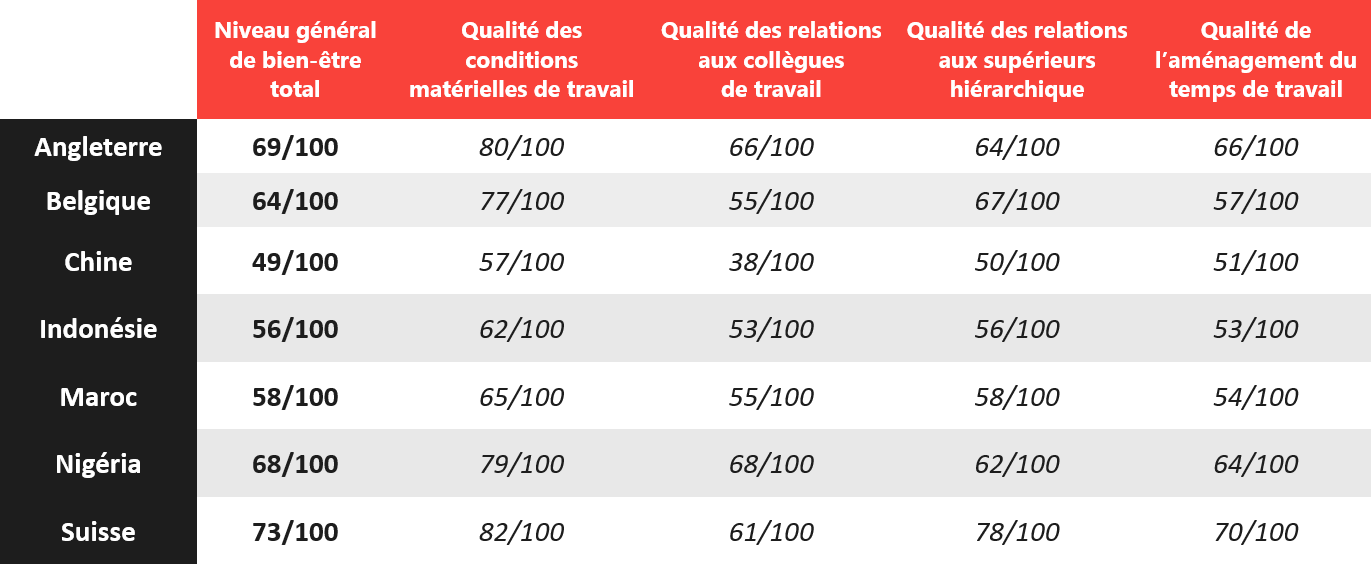- Home
- EN
- Our impact
- ProspeKtive
- French are less happy at work than Americans... but more than Japanese

French are less happy at work than Americans... but more than Japanese
September 2020
The experts
A managerial fad for some, a major trend for others, well-being at work is a strong aspiration to which a growing number of companies are trying to respond. Two HRM researchers - Jordane Creusier from the Université du Littoral and Franck Biétry from the University of Caen - developed a statistically valid measurement scale which they then used in several international studies. In total, more than 3,400 employees in France, the United States and Japan have agreed to participate. The cumulative results show that the enthusiasm and optimism of the United States continues. They are clearly the happiest at work.

In good Poulidor, French employees come in second position behind on average 10 points by an untouchable Armstrong. Japanese bring up the rear with an average score slightly above the symbolic bar of 50 points. As astonishing as it may sound, the well-being at work of French is apparently closer to that of their counterparts in the Far East than that of Americans, despite cultural differences.
This general score corresponds to the accumulation of four fundamental aspects of work: the quality of the material working conditions, those of relations with co-workers and the manager and, finally, the quality of the organization of working time (volume and stability of hours, work-life balance). Americans are not overwhelmed in any of these areas. French are struggling not to be left behind in terms of working conditions and relations between colleagues, without much success it is true. Despite the 35 hours, the scores expressed regarding working time put them behind Japanese (57.1)! Far ahead, Americans seem quite happy in this area (75.5). The regulations, when they exist, are however much looser. Working 50 hours a week is no legendary feat while summer recuperation rarely exceeds two weeks. It remains to be seen whether French are frustrated by the DIRECCTE (a regulation authority for working environments) controls that prevent them from working more or if they bring too much work home ...
Even worse, French are dead last when it comes to the quality of relations with the direct manager (52.2). Obviously, much progress remains to be made in this area to abandon the red lantern and hope to one day join the envious place of escape occupied by Americans (65.8).
Finally, solidarity between work colleagues is certainly the most surprising aspect of this international competition. It is the main source of well-being in the United States (79.3), where individualism reigns supreme. The same is true in France where the unions have struggled for many years now to regulate the peloton. From there to considering that spontaneous collective movements like the yellow vests constitute a form of expression, there is only one step.
Following on from this initial work, this international survey on the measurement of well-being at work is continuing. New data is being acquired. If they are still too few to be analyzed and to be able to draw conclusions, the first raw results from new countries can at least be presented.

China would thus come almost unsurprisingly last in terms of well-being at work, while Swiss would take first place thanks in particular to excellent material working conditions. However, these results still require a bit of work before being confirmed and data from other countries is still being acquired. Together, these elements may give us the keys to understanding the measurement of well-being at work on a global scale.
Jordane Creusier
Franck Biétry
The scale used to measure well-being at work is the one we have developed and published in the Revue de Gestion des Ressources Humaines, which is classified by the CNRS. (Bietry F, Creusier J (2013). Proposal for a positive measurement scale for well-being at work (EPBET), Human resources management review. Vol 87. p 23-41)
Release date: September 2020




